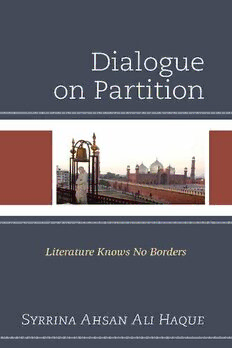
Dialogue on Partition: Literature Knows No Borders PDF
Preview Dialogue on Partition: Literature Knows No Borders
Dialogue on Partition Dialogue on Partition Literature Knows No Borders Syrrina Ahsan Ali Haque LEXINGTON BOOKS Lanham • Boulder • New York • London Published by Lexington Books An imprint of The Rowman & Littlefield Publishing Group, Inc. 4501 Forbes Boulevard, Suite 200, Lanham, Maryland 20706 www .rowman .com 6 Tinworth Street, London SE11 5AL, United Kingdom Copyright © 2021 The Rowman & Littlefield Publishing Group, Inc. All rights reserved. No part of this book may be reproduced in any form or by any electronic or mechanical means, including information storage and retrieval systems, without written permission from the publisher, except by a reviewer who may quote passages in a review. British Library Cataloguing in Publication Information Available Library of Congress Cataloging-in-Publication Data Names: Haque, Syrrina Ahsan Ali, 1971- author. Title: Dialogue on partition : literature knows no borders / Syrrina Ahsan Ali Haque. Description: Lanham : Lexington Books, [2021] | Includes bibliographical references and index. | Summary: “Dialogue on Partition shows how shared time and space as depicted in partition literature can foster dialogue despite separation and relocation. By incorporating the multiple and eclectic perspectives of characters, narrators, writers, and historians, art and literature can be used as tools of integration between sects, religions and differences”—Provided by publisher. Identifiers: LCCN 2020050857 (print) | LCCN 2020050858 (ebook) | ISBN 9781793636249 (cloth ; alk. paper) | ISBN 9781793636256 (epub) Subjects: LCSH: Indic fiction (English)—History and criticism. | Pakistani fiction (English)—History and criticism. | Partition, Territorial, in literature. | National characteristics, East Indian, in literature. | National characteristics, Pakistani, in literature. | Collective memory in literature. | Space and time in literature. | India—History—Partition, 1947—Literature and the partition. Classification: LCC PR9570.S64 H37 2021 (print) | LCC PR9570.S64 (ebook) | DDC 820.9/954—dc23 LC record available at https://lccn.loc.gov/2020050857 LC ebook record available at https://lccn.loc.gov/2020050858 ∞ ™ The paper used in this publication meets the minimum requirements of American National Standard for Information Sciences—Permanence of Paper for Printed Library Materials, ANSI/NISO Z39.48-1992. To the spirit and soul of bygone years, Molding and melding yonder paths and yonder times Living The Quest of “Who Am I?” Contents List of Acronyms ix Foreword xi Acknowledgments xv Introduction xvii 1 Dialogization of Identities in Bapsi Sidhwa’s Ice-Candy-Man 1 2 The Heteroglot World in Khushwant Singh’s Train to Pakistan 35 3 Chronotopal Movement in Anita Desai’s Clear Light of Day 67 4 The Coexistence of Polyphonic Voices in Mehr Nigar Masroor’s Shadows of Time 93 5 Creation of Dialogic Paradigms 127 Bibliography 135 Index 141 About the Author 147 vii List of Acronyms DI The Dialogic Imagination: Four Essays by M. M. Bakhtin FCS “Forms of Time and Chronotope in the Novel: Notes Towards Historical Poetics” by M. M. Bakhtin: PHB Pakistan History Board TLC Theory of the Literary Chronotope Reflections by Bemong, et al. SGLE Bakhtin’s Speech Genres and Other Late Essays by M. M. Bakhtin I&P India and Pakistan: Continued Conflict or Cooperation? By Stanley Wolpert DPH “In Theory Bakhtin: Dialogism, Polyphony and Heteroglossia” by Andrew Robins ix
